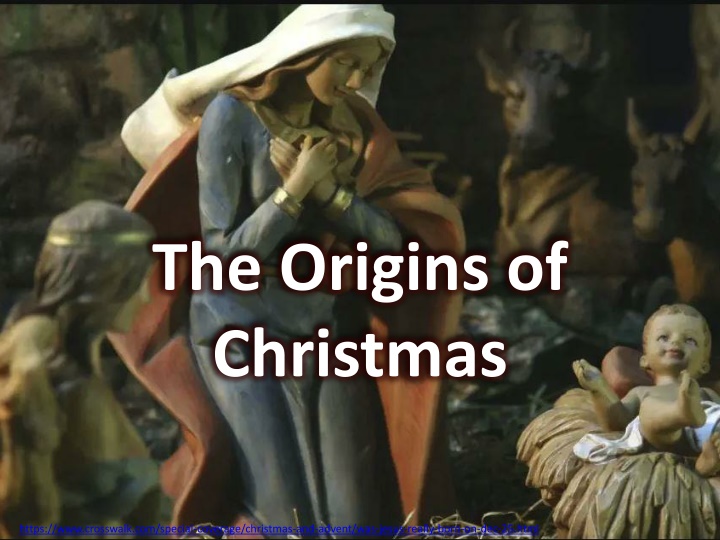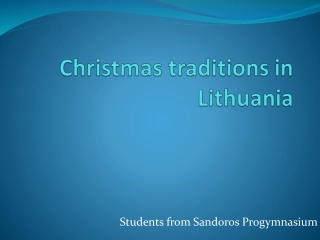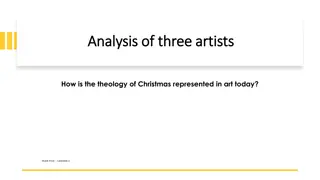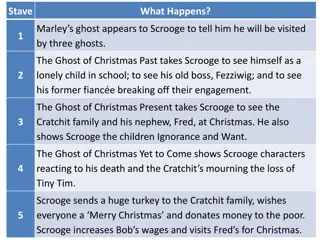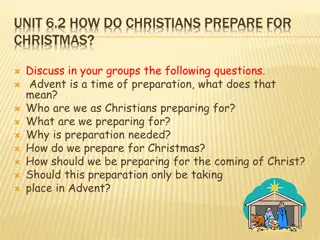The Origins of Christmas
Among Christians, the origins of Christmas are debated, from the alleged borrowing from pagan festivals to the historical Puritan ban on celebrating Christmas. Explore the controversy surrounding the date of Jesus' birth and the traditions associated with Christmas observance.
Download Presentation

Please find below an Image/Link to download the presentation.
The content on the website is provided AS IS for your information and personal use only. It may not be sold, licensed, or shared on other websites without obtaining consent from the author.If you encounter any issues during the download, it is possible that the publisher has removed the file from their server.
You are allowed to download the files provided on this website for personal or commercial use, subject to the condition that they are used lawfully. All files are the property of their respective owners.
The content on the website is provided AS IS for your information and personal use only. It may not be sold, licensed, or shared on other websites without obtaining consent from the author.
E N D
Presentation Transcript
The Origins of Christmas https://www.crosswalk.com/special-coverage/christmas-and-advent/was-jesus-really-born-on-dec-25.html
*The Origins of Christmas Among many Christians today, the accepted narrative is that the practice of observing Christmas came about because early Christians borrowed from pagan religions. Ancient man had many festivals related to the Winter solstice, so they theorize that the Christians borrowed from those. The puritans didn t like the idea of celebrating Christmas in 1659 the Puritan government of the Massachusetts Bay Colony actually banned Christmas. The early law book of the Massachusetts Bay Colony reads as follows: For preventing disorders arising in several places within this jurisdiction, by reason of some still observing such festivals as were superstitiously kept in other countries, to the great dishonor of God and offence of others, it is therefore ordered by this Court and the authority thereof, that whosoever shall be found observing any such day as Christmas or the like, either by forbearing of labor, feasting, or any other way, upon such accountants as aforesaid, every person so offending shall pay of every such offence five shillings, as a fine to the county. https://newengland.com/today/living/new-england- history/how-the-puritans-banned-christmas/ *Based on notes taken from James White s 2016 Church History Series; Lesson 21 Origins of Christmas
*The Origins of Christmas It s true that we re not given a date for the birth of Christ in scripture. Furthermore, we re not given a command to observethe day of Christ s birth. We re told (by some) that Christ could not possibly have been born on December 25 because there would not have been shepherds abiding in the field, keeping watch over their flock by night (Luke 2:8 KJV) in the dead of winter. So you ll hear Christ was probably born in the spring sometime, and it s all tradition, so let s not worry too much about it. *Based on notes taken from James White s 2016 Church History Series; Lesson 21 Origins of Christmas
*The Origins of Christmas But in reality, there is no hard evidence that shepherds in the area of Bethlehem wouldn t have kept their flocks in the field at night during the winter. Israel has a similar climate to Arizona and will often have nights in the middle of winter that are in the 60s. But more importantly, there were also temple flocks that were always out in the field and as long as there was temple worship going on, there had to be flocks for the sacrifices. So this alone is not sufficient reason to say that Christ couldn t have been born on December 25. *Based on notes taken from James White s 2016 Church History Series; Lesson 21 Origins of Christmas
*The Origins of Christmas Where did the December 25th date come from? What is the earliest mention by Christians as to the date of Christmas? In the early church, there was a difference between the churches in the East and the churches in the West as to when Christmas was celebrated. As in the Quartodeciman controversy, the East claimed to have apostolic direction as to when to celebrate the birth of Christ which they did for some time on January 6th (12 days after our Christmas). For some, the period between the two days the twelve days of Christmas eventually became a feast period during which they would celebrate. *Based on notes taken from James White s 2016 Church History Series; Lesson 21 Origins of Christmas
*The Origins of Christmas In the West you begin to see evidence that Christians believed that Christ was born around December 25th as early as the second century: Theophilus, Bishop of Caesarea (A.D. 115-181) We ought to celebrate the birth-day of our Lord on what day soever the 25th of December shall happen. Hippolytus of Rome (A.D. 170-240) - The first coming of our Lord, that in the flesh, in which he was born at Bethlehem, took place eight days before the kalends of January[= December 25th], a Wednesday, in the forty-second year of the reign of Augustus, 5500 years from Adam. (Commentary on Daniel 4:23) * http://dec25th.info/Objections%20Answered.html
*The Origins of Christmas Often, when early church fathers gave a rationale for a December 25th date for the birth of Christ, it was based on the traditional dating of the annunciation of the Angel to Mary which was believed to be March 25th (nine months before December 25th). There is no evidence that early Christians set the date for Christmas for around the same time as the pagan celebrations (that also occurred around the time of the winter solstice) in order to fit in better with the pagans. *Based on notes taken from James White s 2016 Church History Series; Lesson 21 Origins of Christmas
*The Origins of Christmas Sol Invictus (the Unconquered Sun) was a Roman pagan celebration that took place on the 25th of December. However, there is no record of Sol Invictus being celebrated prior to the 4th century, A.D. As we have already seen, Christians had believed that Christ was born on December 25th for at least 200 years prior to that time. Since the date of December 25 already held a lot of significance to the Christian world at the time, who s to say that the pagans (not the Christians!) didn t adopt that date in hopes of stealing worship away from the true Unconquerable Sun of Righteousness (Malachi 4:2)? * https://www.facebook.com/AskDrBrown/posts/is-christmas-pagani-am-sick-and-tired-of-people-simply-saying-that- christmas-has/10205566721912473/
*The Origins of Christmas The winter solstice is another pagan holiday that had a lot of significance to the heathen. It represented to them the sun's regeneration (apparently, their god was sick during the darker part of the winter months and the growing daylight meant he was getting better). It seems inconceivable that the early Christians who suffered so much persecution for faithfully resisting pagan worship would suddenly adopt a pagan holiday on which to celebrate the birth of their Lord. As Augustine (AD 354-430) put it: We hold this day holy, not like the pagans because of the birth of the sun, but because of Him who made [the sun]. * https://www.facebook.com/AskDrBrown/posts/is-christmas-pagani-am-sick-and-tired-of-people-simply-saying-that- christmas-has/10205566721912473/
*The Origins of Christmas James White points out that many of the claims we hear today about Christianity being based on pagan religion is all part of the History of Religions movement, which is basically Darwinian Evolution applied to religion. According to this line of thinking, there can t be anything unique in the teachings of any religion everything has to have been borrowed from other religions such that any time they find what they believe to be a parallel between two religions, they immediately resort to what James calls parallel mania . *Based on notes taken from James White s 2016 Church History Series; Lesson 21 Origins of Christmas
*The Origins of Christmas As a classic illustration of parallel mania, James mentions the Zeitgeist movie which claims that the ancient Egyptians taught that: Their Egyptian god, Horus, was born on December 25th of the virgin Isis. His birth was accompanied by a star in the east, and upon his birth he was adored by three kings. At the age of 12, he was a prodigal child teacher, and at the age of 30 he was baptized by a figure known as Anup and thus began his ministry. Horus had 12 disciples he traveled about with, performing miracles such as healing the sick and walking on water. Horus was known by many gestural names such as The Truth, The Light, God s Anointed Son, The Good Shepherd, The Lamb of God, and many others. After being betrayed by Typhon, Horus was crucified, buried for three days, and thus, resurrected. *Based on notes taken from James White s 2016 Church History Series; Lesson 21 Origins of Christmas
*The Origins of Christmas At first all this seems very troubling. How can the story of Christianity claim to be true when it is so obviously similar to, and therefore probably based on, ancient Egyptian religion? Until you realize that none of these claims made about the ancient Egyptian teaching are true! If you go through the companion guide provided by the makers of the Zeitgeist movie and carefully read their supporting arguments, you will find a lot of very scholarly sounding conjecture that does not support the seemingly amazing parallels touted in their major bullet points: https://citeseerx.ist.psu.edu/viewdoc/download;jsessionid=EFC 0834ED3E97AF7AA29A7535E6772AB?doi=10.1.1.302.4566&rep =rep1&type=pdf *Based on notes taken from James White s 2016 Church History Series; Lesson 21 Origins of Christmas
*The Origins of Christmas James White mentions a fascinating article by Dr. Beckwith (a Christian author who writes scholarly articles) that shows how, using currently available historical data, we actually can calculate the original date of Christmas: We are given a historical connection between Jesus birth and John the Baptist s birth: John was conceived six months before Jesus (Luke 1:36). John the Baptist s father was Zechariah. We know his tribe and we still have historical records telling us the courses of the priests who served in the temple at the time of Jesus birth and we know what order they served in. *Based on notes taken from James White s 2016 Church History Series; Lesson 21 Origins of Christmas
*The Origins of Christmas Putting all this information together, we can figure out when Zechariah would have been serving in the temple, and therefore we can figure out when Elizabeth got pregnant and from that we can figure out when Mary became pregnant. When you do all this, according to Dr. Beckwith s calculations, you get a 2-3 week window for Christ s birth between December 25th and January 6th. I was never able to find the article by Dr. Beckwith that James referenced, but I did find a set of very detailed calculations that seem to track with the line of reasoning described above: http://www.dec25th.info/Unto%20You%20Is%20Bor n%20This%20Day.html#_ftnref19 *Based on notes taken from James White s 2016 Church History Series; Lesson 21 Origins of Christmas
The Origins of Christmas Okay, so maybe the date on which we celebrate Christmas doesn t come from paganism, but surely many of the other traditions associated with Christmas were picked up from pagan practices, right? Things like: Christmas trees Santa Clause Candles Gift Giving Christmas Cards Perhaps. But perhaps not. Lets look at where some of these ideas may have come from.
*The Origin of the Christmas Tree Among the many accounts claiming to explain the origin of the Christmas tree, the three most popular are from Germany making it the likeliest place of origin. The stories span from the 8th to the 16th century. All three have at least some elements of historical fact. The first story is about St. Boniface. In the 8th century, he was a missionary to some of the remotest tribes of Germany. He is probably best known for what is called the Felling of Thor s Oak. It is said that upon entering a town in northern Hesse (Hessia), Boniface learned that the people worshiped the god Thor who they believed resided in a great oak tree among them. * https://www.crosswalk.com/special-coverage/christmas-and-advent/what-is-christmas-understanding-the- history-and-origin.html
*The Origin of the Christmas Tree Boniface determined that if he wanted to earn an audience with the people, he would have to confront Thor. He announced before the people that he was going to cut down the oak, and he openly challenged Thor to strike him down. Miraculously, as Boniface began to chop the oak, a mighty wind blew and hurled the tree to the ground. * https://www.crosswalk.com/special-coverage/christmas-and-advent/what-is-christmas-understanding-the- history-and-origin.html
*The Origin of the Christmas Tree Tradition holds that a fir tree was growing in the roots of the oak, and Boniface claimed the tree as a symbol of Christ. Needless to say, the people readily accepted Boniface s message, and the tree eventually came to be associated with the birth of Christ and a celebration of the day when the mighty God (who could hurl a gigantic oak to the ground) chose to humbly enter the world as a babe. * https://www.crosswalk.com/special-coverage/christmas-and-advent/what-is-christmas-understanding-the- history-and-origin.html
*The Origin of the Christmas Tree A second possible source of the Christmas tree (and probably the most likely) comes from medieval religious plays in Germany. Among the most popular of these plays was the Paradise play. It started with the creation of man, acted out the first sin, and showed Adam and Eve being expelled from Paradise (the Garden of Eden). It closed with the promise of a coming Savior, which made the play a particular favorite during the Christmas season. In the play, the Garden of Eden was most often represented by a fir tree hung with apples and surrounded by candles. * https://www.crosswalk.com/special-coverage/christmas-and-advent/what-is-christmas-understanding-the- history-and-origin.html
*The Origin of the Christmas Tree A third tradition about the origin of the Christmas tree attributes it to Martin Luther, an influential leader of the Reformation. Some say that on Christmas Eve, Luther was walking through the woods near his home. He was struck by the beauty of how the snow shimmered in the moonlight on the branches of the trees. In an effort to re-create the magnificent sight for his family, he cut down the tree, placed it in his home, and decorated it with candles. Another version of this story is that Evergreen Trees were the symbol of eternal life and Martin Luther was using the tree that he presented to his family on Christmas Eve as a picture of our endless life in Christ. * https://www.crosswalk.com/special-coverage/christmas-and-advent/what-is-christmas-understanding-the- history-and-origin.html
*The Origin of the Christmas Tree One final (falsely) suggested origin of the Christmas tree I should mention some Christians will quote Jeremiah 10:2-4 out of context in order to try to prove that God condemns the use of Christmas trees: Thus says the LORD: Learn not the way of the nations 3 for the customs of the peoples are vanity. A tree from the forest is cut down and worked with an axe by the hands of a craftsman. 4 They decorate it with silver and gold; they fasten it with hammer and nails so that it cannot move But if we examine the context of this passage, it is not talking about a Christmas tree, but a wooden idol that the heathen nations would carve from a tree and worship.
*The Origin Santa Clause In 1822, Clement Moore wrote a poem for children about Santa Clause that has never been forgotten. It was entitled, Twas the Night before Christmas... ! Where did the idea of Santa Clause come from? Santa Claus is a Dutch word that is actually Sinter Claus, Saint Nicholas , in English. Saint Nicholas was a supposed early Bishop of a church in Asia Minor [the modern country of Turkey] (AD 270 343). He became aware of some desperate needs in his congregation, and a family having to sell their children into slavery, so one night he came and left money on their doorstep. It was gold in a stocking. * https://www.crosswalk.com/special-coverage/christmas-and-advent/what-is-christmas-understanding-the- history-and-origin.html
*The Origin Santa Clause Santa Claus is generally depicted as a portly, jolly, white-bearded man sometimes with spectacles wearing a red coat with white fur collar and cuffs, white-fur-cuffed red trousers, a red hat with white fur and black leather belt and boots and who carries a bag full of gifts for children. This image became popular in the United States and Canada in the 19th century due to the significant influence of Clement Moore s children s poem that I mentioned earlier along with a depiction created by the political cartoonist Thomas Nast. * https://en.wikipedia.org/wiki/Santa_Claus
*The Origin Santa Clause This image has been maintained and reinforced through song, radio, television, children's books, films, and advertising. * https://en.wikipedia.org/wiki/Santa_Claus
*Other Christmas Symbols Gifts are a reminder of the gifts of the Magi to baby Jesus. (Matthew 2) Candles are a picture that Christ is the Light of the world (John 8). Bells are associated with ringing out news. Christ is the good news, the best news of all. Christmas Cards started in 1844. An English artist named William Dobson, drew up some pictures in England for use at this season. They found local use there and soon spread to America. In 1846 Cole and Horsley saw the commercial potential of this growing tradition and started the production of what is now over a $1,000,000,000.00 industry, that sees 4 billion cards sent each year in America alone. * https://www.crosswalk.com/special-coverage/christmas-and-advent/what-is-christmas-understanding-the- history-and-origin.html
Class Discussion Time https://www.weareteachers.com/moving-beyond-classroom-discussions/
*Class Discussion Time What are your thoughts about Christians celebrating Christmas? As we pointed out, the date for Christmas is not given in scripture and we re not commanded in scripture to celebrate Christmas. So, does this mean it s wrong to celebrate it? What would you say to a fellow believer who believes that it s wrong to celebrate Christmas because he believes it s based on paganism, or is really just a Roman Catholic holiday, etc. and is therefore offended by people who do celebrate Christmas? What would you say to a Christian who believes Jesus is the reason for the season and is offended by people who don t celebrate Christmas?
